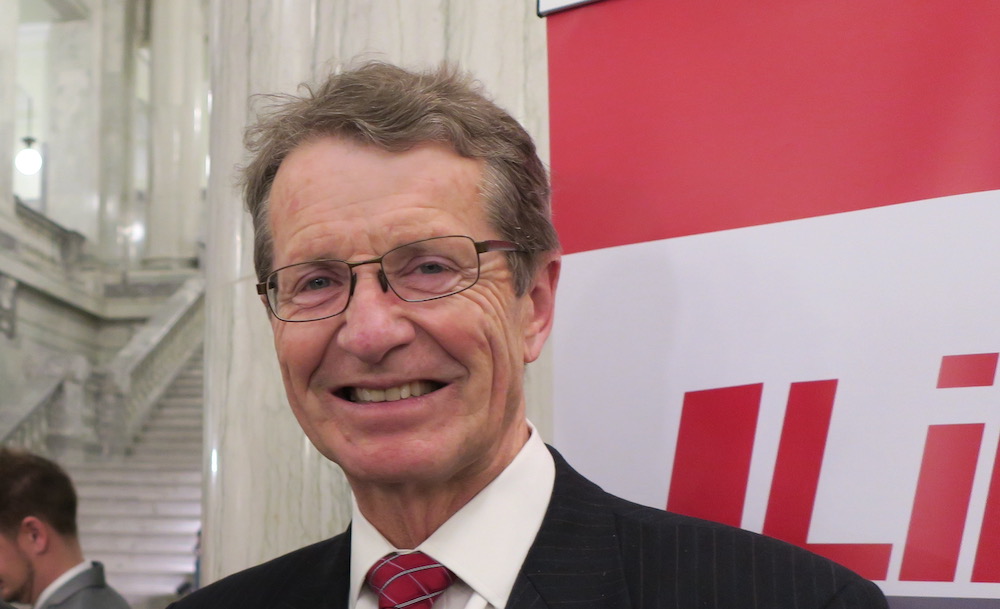The sudden firing of a medical officer of health was a shocking development in Alberta politics.
On Oct. 2, 2002, the medical officer of health for the Palliser Health Authority in southeastern Alberta was informed he’d been terminated for speaking out on the harmful health impacts of burning fossil fuels and expressing his support for the Kyoto Protocol.
“I was shocked,” David Swann told the CBC three days after his dismissal by the health authority’s board.
“This is not the board that I have worked with for five years.” he said. “They have been respectful, they have been supportive of public health.”
But board chair Len Mitzel, who also happened to be president of the Cypress-Medicine Hat Progressive Conservative Constituency Association, made no apologies.
The Kyoto Protocol, the international treaty drafted in 1997 with the goal of reducing greenhouse gas emissions and thereby slowing global climate change, was bad for Alberta’s economy, he told the media.
“The whole health industry, which the board is charged with administering and delivering, is driven by the economy,” Mitzel said. “Everything is economy-driven, and any downturn, especially as severe as this looks like it’s going to be in the economy, is going to have a very detrimental effect on the health industry and the ability for us to deliver health services.”
Mitzel denied the fact the MLA he’d worked to elect, environment minister Lorne Taylor, had anything to do with Swann’s firing, although plenty of Albertans didn’t believe him.
As for Swann, he said a medical officer of health must be able to speak out on health issues.
“The Society of Medical Officers of Health supports the Kyoto Protocol as a way of improving health, particularly respiratory health, in the country,” he observed. He was president of the society at the time he was fired.
He continued to support Kyoto, Swann said.
The resulting commotion didn’t last long. Shamed, only eight days after he was unceremoniously canned, the Palliser Health Authority Board held an emergency meeting and offered Swann his job back.
“There is complete agreement the medical officer of health has the right and responsibility to be an independent voice on issues related to public health,” a statement jointly released by the authority and Swann read.
Swann didn’t return to his role as Palliser medical officer of health. A physician, he did humanitarian service in Iraq, then returned to Alberta to run successfully as a Liberal in the 2004 provincial election—the same year Canada signed the Kyoto Protocol.
Swann would serve as MLA for Calgary—Mountainview until 2019.
Mitzel was somehow able to overcome the embarrassment of firing Swann. He was elected to the Legislature as MLA for Cypress—Medicine Hat in 2008 and served two terms as a back-bench PC MLA. He was unseated in 2012 by Wildrose candidate Drew Barnes.
In 2008, Swann became the leader of the Opposition, a role he filled until 2011. He would lead the Alberta Liberals again on an interim basis after the end of Raj Sherman’s troubled leadership.
While Swann never successfully challenged the PCs’ hold on power, he was an effective critic of the government and a strong voice in the Legislature for moderation in policy and common sense in health care. His advocacy had a positive impact on the policies of several PC premiers.
Compare that to the performance Monday of Alberta Chief Medical Officer of Health Deena Hinshaw.
With the fifth wave of the COVID-19 pandemic crashing through Alberta, powered by the hyper-infectious Omicron variant of the virus, Hinshaw seemed, via a video link to her pandemic briefing, dispirited.
Asked by a reporter about the possibility of new restrictions to slow the Omicron wave, she responded sharply, “Decisions about restrictions are not mine to make.”
Was that the verbal shrug of a disillusioned functionary, who has basically given up on her job in the face of more COVID-19 cases than ever before, overwhelmed and rationed testing, and a recalcitrant government skeptical of sound public health measures?
It was certainly “a higher-than-normal degree of buck-passing,” observed Maclean’s Magazine correspondent Jason Markusoff via tweet.
Pressed again, Hinshaw insisted her role is only to advise government, and she couldn’t comment on cabinet decisions.
Three health law experts interviewed by the Calgary Herald this week challenged Hinshaw’s opinion.
“Strictly legally speaking, she is the decision-maker,” University of Calgary law professor Shaun Fluker told the Herald.
The chief medical officer of health is “clearly granted” authority to do what must be done to address a public health emergency, University of Alberta law professor Ubaka Ogbogu told the Herald’s reporter.
Section 29 of the Public Health Act “demands that government listen to her,” Ogbogu said. “As a matter of fact, the government should not overrule her.”
The United Conservative government could fire her if she challenged the Kenney cabinet’s dangerous advice, but what of it?
Sometimes, as Swann illustrated, the courage to take a difficult stand is required to do the right thing—and sometimes a demonstration of courage will bring the public to the side of a brave public official.
Hinshaw has chosen another course.
Whatever happens in the weeks and months again, it’s becoming more difficult for many Albertans to re-elect Hinshaw based on her job performance.



